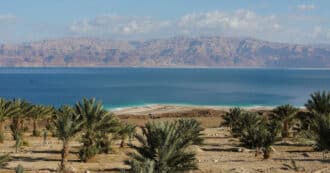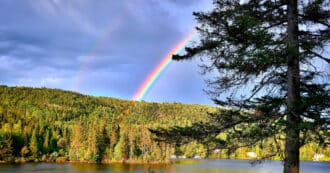By Sydney Cohen – The study of political ecology is the combination of politics, which includes government and institutions, with ecology. It looks at how human activity impacts environments to produce natural resource scarcity or abundance. For example, a drought in one country may lead to famine if there are not adequate food storage facilities available because people have depleted their resources in other areas like deforestation.
This blog post is about the ways that humans can interact with their environment. It goes into depth about how we have to think of our natural resources as a whole, rather than just individual parts, in order to make better decisions for future generations.
Continue reading to learn more about how our political landscape intersects with the environment, and what we can do to make the world a more sustainable place, for future generations!
Studying the Political Economy in Relation to Political Ecology
The modern concept and term political ecology emerged in the late 1960s with a group of French scholars and activists, including Michel Foucault, who linked ecological ideas to questions of power. These scholars argued that it is important to study how different social groups interact with each other and the environment. They wanted to see connections between environmental degradation, social inequality, poverty and hunger.
The political economy is a term that addresses the intersection between politics and economics. It looks at how economic systems are structured, what forces influence them, and who benefits from their existence. The study of the political economy emerged as an intellectual movement in response to the Industrial Revolution and its negative impact on living conditions for many people.
Political ecology is also concerned with these issues, but it applies more specifically to environmental issues such as land use or resource extraction that have been shaped by political factors such as colonialism or globalization.
The study of urban political economy and ecology is an important one. Social scientists look at power relations (material and discursive) and dynamics in urban environments, often fueled by economic incentives, and examine the way that these power dynamics influence and shape the lives of humans and other species in city settings.
Given our increasing populations in cities, scientists recognize the importance of understanding the political-economic aspects of life and seek to understand ways that we can better our responses to environmental problems that are impacted by the economy, such as distribution of costs, access to and control of local food, nature, and natural resources, our relations to physical geography and how that works together with social and economic dynamics, and affects our social organization.
Environmental Determinism in Understanding Political Ecology
Social sciences emphasize focus on cultural ecology – that is, how our culture is shaped by our physical geography. This is often referred to as environmental determinism, which understands cultural organization and behaviors as directly influenced by the physical geography of the land.
This is an incredibly important subfield of study, as it works to understand the ecology of various environmental problems, such as soil erosion, land degradation and society, costs and benefits of living in a physical space that allows for trade and commerce, human geography and human ecology, the environmental history of particular regions, and the field of political and economic geography.
Environmental determinism is vital to understanding the political and economic aspects of life, particularly in the study of third world political ecology. Over the hundreds of years that this field of study has been around, it has worked to understand economic development in regions, based upon their physical geography. It is a multi-disciplinary take on political ecology anthropological studies and has found that there are physical explanations for the success and challenges of different regions’ political development studies.
Environmental Racism in Understanding Political Ecology
In the developing world, there is an uneven distribution of wealth and power, as many nations with more recent histories of colonization do not have the same resources and societal organization for thriving cultures and societies, which affects their political-economic landscape and income generation. Environmental change in a natural environment is not always realistic, and economic determinism is a solid explanation for why some countries have successfully developed democracies, and why others still struggle. This additionally affects studies of environmental justice in the context of environmental racism, as responses to environmental racism can be supported by understanding how geography anthropology directly affects the development of cultural ecology, organization, and society.
Political Ecologists
A political ecologist is a political scientist with an ecological focus. The political ecology of a region, nation, or world can be studied by political ecologists in order to understand how political and economic forces interact with natural resources and landscapes. Political ecology can help us understand why some areas in the world are rich while other regions are poor.
For example, many people believe that oil-producing nations like Saudi Arabia have grown wealthy because they were fortunate enough to live near such valuable resources. However, this has not been true for all countries which have had access to petroleum.
Political ecologists study broader topics such as environmental politics and development studies. Within these studies, political ecologists can focus on subjects such as the political economy of soil, or the economy of soil erosion, for example.
The Origin of the Term “Political Ecology”
While the term political ecology was originally coined in 1935 by Frank Throne in an article, it was not popularized until 1972 when anthropologist Eric Wolf published an article titled “Ownership and Political Ecology”, that revolutionized the field.
This prompted many more studies in the 1970s and 1980s that focused on the topics of development geography and cultural ecology, topics that were becoming increasingly more relevant to our rapidly modernizing and globalizing world.
In these lines of study, geographer and scholar Piers Blaikie published many works on the sociopolitical origins of soil erosion, and it was Blaikie 1985 that launched the popularity of the study of the political economy of soil, in particular. Harold Brookfield and Piers Blaikie also published a book on 1987 land degradation. Blaikie and Brookfield 1987 acknowledge the interconnectedness of land degradation and society, a more focused topic within the field of political ecology and political economy.
The Development of Political Ecology
Historically, political ecology “research has sought primarily to understand the political dynamics surrounding material and discursive struggles over the environment in the third world,” according to geographer Raymond L. Bryant in his 1998 article.
Additionally, British geographer Richard Peet and University of California professor Michael Watts published “Liberation Ecologies: Environment, Development, Social Movements” in 2004. Peet and Watts explored the dynamic and power relations in our world, unpacking new ecological problems at the time and global ecological politics.
Even more modern than that, in 2019, Paul Robbins published “Political Ecology: A Critical Introduction”, creating an accessible exploration of the field. As the study of political ecology has grown exponentially in importance given the increasing globalization of our modern world, there have been many publications aiming to make the field more accessible to everyone.
Feminist Political Ecology
Feminist political ecology is an emerging field of study that seeks to understand the intersectionality between feminist theories and environmental issues. The feminist political ecology studies how systems of oppression such as colonialism, patriarchy, capitalism, and racism have influenced ecological processes.
Cristina Flesher Fominaya‘s feminist political ecology is a feminist perspective on the field of environmentalism that focuses on “the relationship between social and ecological justice.” It takes into account how people are marginalized in society by race, class, or gender. The feminist political ecology view strives to understand how these different factors can harm both humans and ecosystems.
A Leader in Feminist Political Ecology
Cristina Flesher Fominaya’s early work in the relationship between social justice and the environment paved the way to her current career, where she is the editor-in-chief of Social Movement Studies peer-reviewed academic journal, that covers social science research on social movements, collective behavior, and protests. According to her Loughborough University biography, where she has previously taught, “her work focuses on European and global social movement and politics with special attention to democracy, culture, collective identity and media,” and “she has won numerous international scholarships including the Marie Sklodowska-Curie IEF Fellowship, the National Science Foundation Fellowship, the German Marshall Fellowship, and the Leo Lowenthal Prize for Outstanding Paper in Culture and Critical Theory awarded by the University of California, Berkeley.”
Cristina Flesher Fominaya is only one example of a feminist political ecologist who has received an immense amount of university press, as a result of her rigorous academic accomplishments in political ecology and political-economic studies.
Political Ecology In The University Of California Press
The University of California Press has released many articles on various topics of social sciences, political ecology and the political economy, such as on progress in human geography, environmental knowledge, and relations between human development and the environment.
They have many useful articles on their site, that are helpful to understanding the political landscape of different countries, and the relations between the political economy and the natural environment. Topics such as these include health and education, food sovereignty, and the use of local natural resources. Their website can be found here.
The Journal of Political Ecology
An additional resource for learning more about studies within the field of political ecology is the Journal of Political Ecology. The Journal of Political Ecology studies interdisciplinary topics in the field of political ecology, such as “multi-scalar analysis of environmental issues and ecologies, access to resources (e.g. by race, gender, status, wealth), environmental and social justice, feminist, materialist, and intersectional theories, and studies of vulnerability and disadvantage.” These are all important issues to learn about if we want to better understand our world today, and formulate solutions to our societal and ecological problems.
Why Political Ecology is Essential to YOU!
Political ecology is an incredibly important area of study if we want to understand the relationship between economic systems and our environment. It can be just as important to understanding our world today, and how it will evolve in the future. As we face a changing climate and an ever-changing geopolitical landscape, political ecology provides insight into why certain countries are more successful than others at forming functional democracies that prioritize sustainable development practices for their people.
It’s time we all start paying attention to this area of study if we want to understand what is happening around us – from changes in global temperatures to increased poverty rates worldwide.
According to Dominic Wilkins in Where is religion in political ecology, “the failure to critically engage with the study of religion has led political ecologists to neglect important factors in their analyses and has resulted in incomplete conceptualizations of interpersonal power relations.” Understanding political ecology and the role of religion can give us the understanding we need to save our planet and ourselves from environmental catastrophe.
* Featured image source
Follow this link to learn more about Ecological Balance.







